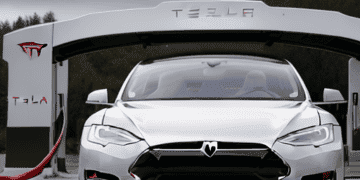Tesla’s shares experienced a nearly 10 percent drop on Thursday following remarks from Chief Executive Elon Musk indicating that the electric vehicle manufacturer plans to persist in cutting prices to stimulate demand, even at the expense of reduced profit margins.
The stock reached $163 during trading, influencing other automakers as well. Around 15 analysts adjusted their price targets for Tesla, potentially causing the company’s market value to decrease by $50 billion to approximately $517 billion. If sustained, this would position Tesla’s value below that of Meta Platforms for the first time since 2021.
In response to a challenging macroeconomic environment and weakening demand, Tesla has chosen to prioritize unit sales over immediate profits, according to analysts at Canaccord Genuity. The first quarter saw Tesla’s gross profit margins drop to their lowest point in over two years, failing to meet market expectations. This decline resulted from a global price competition initiated by the company in January to defend its US dominance and expand its presence in China, the second-largest market.
Excluding regulatory credits and leasing, Tesla’s automotive gross margin stood at 18.3 percent, falling short of the 20 percent target provided by Chief Financial Officer Zachary Kirkhorn in January. A higher gross margin signifies a company’s ability to retain more capital, which can be used to cover various costs or service debt.
Tesla has already implemented six price cuts this year, with Musk hinting at the possibility of additional reductions. In a weak economy, the company plans to prioritize sales growth over profit.
Elaborating on this strategy, Musk stated, “We’ve taken a view that pushing for higher volumes and a larger fleet is the right choice here versus a lower volume and a higher margin.”
Investors responded by selling off shares of automakers globally, concerned that maintaining market share in a slowing market might require sacrificing profit margins. While some believe Tesla’s approach is the correct long-term strategy, others anticipate near-term challenges, with RBC analyst Tom Narayan acknowledging that margins might worsen before improving.
The repercussions were felt across the automotive industry, with US automakers like Ford Motor Co and startups such as Lucid Group experiencing share declines ranging from 3.3 percent to 4.4 percent. French automaker Renault, committed to not drastically reducing prices on its electric vehicles amid Tesla’s downward trend, saw a 7.6 percent decline, while Germany’s Volkswagen fell 3.5 percent.
Find the latest supply chain report news at The Supply Chain Report. For international trade tools, see ADAMftd.com.
#Tesla #ElonMusk #ElectricVehicles #EV #StockMarket #Automakers #PriceCuts #DemandStimulus #ProfitMargins #MarketValue #GlobalEconomy #TeslaStrategy #FordMotor #LucidGroup #Renault #Volkswagen #AutomotiveIndustry #MacroEnvironment #StockDecline #TeslaShares #CarManufacturers #USAutomakers #EVPriceCuts #VehicleSales

















